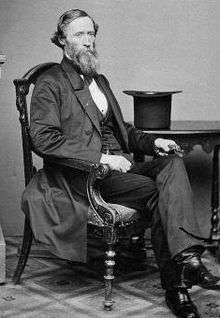John Blair Smith Todd
| John Blair Smith Todd | |
|---|---|
 | |
| Born |
April 4, 1814 Lexington, Kentucky |
| Died |
January 5, 1872 (aged 57) Yankton County, Dakota Territory |
| Place of burial | Yankton City Cemetery, Yankton, South Dakota |
| Allegiance |
United States of America Union |
| Service/branch |
United States Army Union Army |
| Years of service | 1837–1856, 1861–1862 |
| Rank |
|
| Battles/wars |
Seminole Wars Mexican-American War -Siege of Veracruz -Battle of Cerro Gordo American Civil War |
| Other work | Delegate from Dakota Territory to the United States House of Representatives |
John Blair Smith Todd (April 4, 1814 – January 5, 1872) was a Delegate from Dakota Territory to the United States House of Representatives and a general in the Union Army during the American Civil War.
Biography
Todd was born in Lexington, Kentucky to John and Elizabeth (Smith) Todd, and moved with his parents to Illinois in 1827. His first cousin was Mary Todd Lincoln, wife of Abraham Lincoln. Thus he was cousin-in-law with the President.[1] Another cousin-in-law was Confederate General Benjamin Hardin Helm. Helm's father was Kentucky Governor John Helm; Helm's mother was a first cousin, three times removed of Colonel John Hardin, who was related to three Kentucky Congressmen.
Todd graduated from the United States Military Academy at West Point, New York, in 1837,[2] and was assigned to the 6th U.S. Infantry. He was promoted to first lieutenant on December 25 and served with his regiment in the Seminole War from 1837 until 1840. He returned home on recruiting service during part of 1841, and again in active service in the Florida war during the remainder of that year and part of 1842.
He was made captain in 1843, and was on frontier duty in Indian Territory and Arkansas until 1846. He served in the Mexican-American War in 1847, taking part in the Siege of Veracruz and the battles of Cerro Gordo and Amazoque. Todd was on garrison and frontier duty till 1855, when he was engaged in the action of Blue Water against the Sioux Indians. He resigned from the United States Army on September 16, 1856, and became an Indian trader, settling at Fort Randall, Dakota Territory. He was admitted to the bar in 1861 and commenced the practice of law in Yankton.
With the outbreak of the Civil War, he was appointed on September 19, 1861, as a brigadier general of Volunteers. He was in command of the North Missouri district from October 15 until December 1, 1861. He resigned from the Army on July 17, 1862.
He was a delegate to the 37th and 38th United States Congress, between 1861 and 1865. When the Dakota Territory was formed, Todd was elected as a Democrat to the House, serving from December 9, 1861, to March 3, 1863. He was reelected to serve from June 17, 1864, to March 3, 1865. He was an unsuccessful candidate for reelection in 1864, and returned to Yankton. He served as speaker of the territorial House of Representatives in 1866 and 1867. He was once again unsuccessful in running for the nomination for a Congressional seat in 1868.
He died in Yankton County and is interred in Yankton Cemetery. Todd County, South Dakota and Todd County, Minnesota are named after him.
See also
Notes
- ↑ "The Family of Mary Lincoln", a web page showing the Todd family genealogy
- ↑ Upham, Warren (1920). Minnesota Geographic Names: Their Origin and Historic Significance. Minnesota Historical Society. p. 543.
References
- United States Congress. "John Blair Smith Todd (id: T000292)". Biographical Directory of the United States Congress. Retrieved on 2008-02-12
- "John Blair Smith Todd". Find a Grave. Retrieved 2008-02-12.
 This article incorporates text from a publication now in the public domain: Wilson, James Grant; Fiske, John, eds. (1891). "article name needed". Appletons' Cyclopædia of American Biography. New York: D. Appleton.
This article incorporates text from a publication now in the public domain: Wilson, James Grant; Fiske, John, eds. (1891). "article name needed". Appletons' Cyclopædia of American Biography. New York: D. Appleton.
Further reading
- Mattison, Ray H., ed., "The Harney Expedition Against The Sioux: The Journal of Capt. John B.S. Todd." Nebraska History 43 (June 1962): 89-130.
- Wilson, Wesley C., "General John B.S. Todd, First Delegate, Dakota Territory." North Dakota History 31 (July 1964): 189-94.
| United States House of Representatives | ||
|---|---|---|
| Preceded by None, first in line |
Delegate to the U.S. House of Representatives from Dakota Territory December 9, 1861 – March 3, 1863 |
Succeeded by William Jayne |
| Preceded by William Jayne |
Delegate to the U.S. House of Representatives from Dakota Territory June 17, 1864 – March 3, 1865 |
Succeeded by Walter A. Burleigh |
